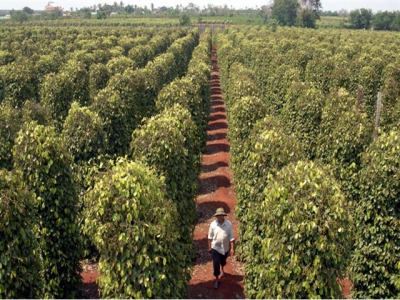Bình Phước grows more organic pepper for export markets

Despite the pandemic and low pepper prices, many households and cooperatives in Bình Phước Province have continued growing pepper and maintained high productivity under sustainable models.
The province has 15,889 hectares of pepper, the main crop of the province, mostly grown in border districts such as Lộc Ninh, Bù Đốp and Hớn Quản, yielding more than 1.8 tonnes per hectare and 24,307 tonnes per year.
Since many farmers have faced difficulties with low output prices and diseases causing pepper plants to die, they have formed cooperatives to grow clean and organic pepper to meet increased market demand.
Phạm Thanh Chung, who led an organic pepper cooperative in Lộc Quang Commune, said that he had been able to sell everything grown on his 29 hectares of organic pepper.
The cooperative harvested 75 tonnes of pepper between 2020 and 2021 and expects to collect about 95 tonnes during 2021 and 2022.
In order for the pepper garden to grow well, the cooperative used Trichoderma probiotics to create beneficial organics that fight against harmful fungi and protect the root zone.
Phan Chính Thuần, head of Hiệp Tiến Agriculture and Service Cooperative in Lộc Hiệp Commune, said that 40 members of the cooperative had been working on 70 hectares of land with a yield of 4 tonnes per hectare. Farmers were able to collect VNĐ180 to 200 million per hectare.
As the cooperative had a stable output, pepper prices were not under pressure from small traders, and if the pepper was of high quality, farmers received an additional VNĐ3,000 to 5,000 for every kilo of pepper sold.
Sustainable development
Bình Phước Department of Agriculture and Rural Development since 2013 has cooperated with Nedspice Vietnam Company to develop a sustainable pepper production model according to RA standards on planting, harvesting, drying and preserving pepper.
Every step must follow a set of principles from relevant authorities, ensure labour safety, and not cause environmental pollution.
Currently, the province has 65 pepper clubs following RA standards with 2,000 households covering an area of 2,000 hectares creating an output of 3,500-4,000 tonnes per year.
Bình Phước aims for sustainable and organic pepper production on a larger scale while building new clean agricultural projects, quality branding, and finding potential markets for pepper.
Phương Thành Trận in Thiện Hưng Commune, who has 15 hectares of certified organic pepper, said that many partners have bought pepper for export to Japan and European markets at the price of VNĐ100,000-120,000 per kilo.
Trận considers it as good business as the market value of pepper is at VNĐ80,000-85,000 per kilo.
Lê Thị Ánh Tuyết, deputy director of the provincial Department of Agriculture and Rural Development, said that authorities were determined to change pepper production habits in an organic and sustainable way to improve the product value chain.
Bình Phước would continue to focus on developing pepper production according to RA and organic standards, including using good varieties, diversifying products, processing, and developing pepper production according to international standards for export, she said.
Có thể bạn quan tâm
 Sugar imports reach a record of more than 1.7 million tonnes
Sugar imports reach a record of more than 1.7 million tonnes In 2021, sugar imports increased sharply and reached more than 1.7 million tonnes, creating new records in terms of quantity and value in sugar imports.
 City lends helping hand to farmers, processors in Mekong Delta as lack of exports causes
City lends helping hand to farmers, processors in Mekong Delta as lack of exports causes The HCM City Department of Industry and Trade is seeking to promote the consumption of agricultural products from Mekong Delta provinces
 EU remains highly potential importer of Vietnamese rice
EU remains highly potential importer of Vietnamese rice With stable and high demand for specialty rice from Asia, the European Union (EU) remains a highly potential market for rice exporters of Việt Nam